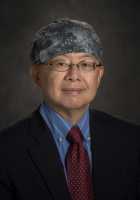08 Jun Panitumumab (Vectibix) For Primary HER2-Negative Inflammatory Breast Cancer
MedicalResearch.com Interview with:
 Naoto Tada Ueno, M.D., Ph.D., F.A.C.P.
Naoto Tada Ueno, M.D., Ph.D., F.A.C.P.
Executive Director, Morgan Welch Inflammatory Breast Cancer Research Program and Clinic
Section Chief, Section of Translational Breast Cancer Research, Department of Breast Medical Oncology
Division of Cancer Medicine
The University of Texas MD Anderson Cancer Center
Houston, TX
MedicalResearch.com: What is the background for this study? What are the main findings?
Response: The best outcome of inflammatory breast cancer (IBC) is dependent on achieving a pathological completed response after neoadjuvant chemotherapy for primary inflammatory breast cancer, which is the most aggressive type of breast cancer.
We have conducted extensive preclinical work, which showed that EGFR is a potential therapeutic targets of IBC.
Based on this preclinical data, we have conducted a phase II study to determine the pathological complete response rate of panitumumab plus neoadjuvant chemotherapy for HER2 negative primary inflammatory breast cancer.
MedicalResearch.com: What should readers take away from your report?
Response: The combination of PmAb and neoadjuvant chemotherapy produced pathologic complete response rates of 14% in patients with HER2-negative, hormone receptor-positive disease and 42% in patients with triple-negative IBC (TN-IBC). Treatment-related hematological and dermatological toxic effects were substantial but transient, and there were no treatment-related deaths. This pCR rate for TN-IBC is one of the highest reported. We are very much excited with this phase II data, which may help to improve the survival of patient with inflammatory breast cancer.
MedicalResearch.com: What recommendations do you have for future research as a result of this study?
Response: Base on this study, we are currently conducting a randomized study to definitively show that panitumumab is an effective treatment for TN-IBC. Further, for ER+ inflammatory breast cancer, we are conducting pan-HER kinase inhibitor, which also suppress EGFR, in ER+ primary inflammatory breast cancer.
Disclosures: The research was supported by Amgen and Celgen, Morgan Welch Inflammatory Breast Cancer Research Program, and State of Texas Rare and Aggressive Breast Cancer Research Program Grant.
Citation:
The information on MedicalResearch.com is provided for educational purposes only, and is in no way intended to diagnose, cure, or treat any medical or other condition. Always seek the advice of your physician or other qualified health and ask your doctor any questions you may have regarding a medical condition. In addition to all other limitations and disclaimers in this agreement, service provider and its third party providers disclaim any liability or loss in connection with the content provided on this website.
Last Updated on June 8, 2018 by Marie Benz MD FAAD
